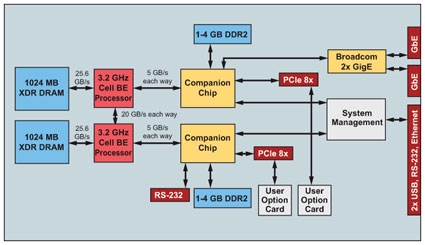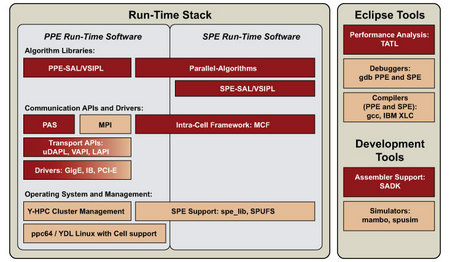New Cell-based blade, tools support Linux
Feb 28, 2008 — by Eric Brown — from the LinuxDevices Archive — 8 views Mercury Computer Systems is shipping a high-performance computing (HPC) blade system based on Cell processors. The 1U Dual Cell-Based System 2 (DCBS-2) is equipped with two Cell Broadband Engine (BE) processors, runs Linux, and is available with an updated version of Mercury's MultiCore Plus tools.
Mercury Computer Systems is shipping a high-performance computing (HPC) blade system based on Cell processors. The 1U Dual Cell-Based System 2 (DCBS-2) is equipped with two Cell Broadband Engine (BE) processors, runs Linux, and is available with an updated version of Mercury's MultiCore Plus tools.
(Click for larger view of DCBS-2)
The DCBS-2 is aimed at applications that demand a low acoustic signature in a high-density IU form factor, such as wafer and mask inspection, beam writing, EDA, computational lithography, aerospace, and defense applications, says Mercury. Each of the two Cell processors runs at 3.2GHz, says the company, for a total of 410 GFLOPS. Performance is boosted further due to the mapping of signal processing algorithms onto the system, which is said to provide improvements in optical proximity correction (OPC) and computational lithography performance, especially when DCBS-2 blades are clustered or networked.

DCBS-2 block diagram
The DCBS-2 is equipped with two companion chips that provide high-speed bridges to PCI Express and gigabit Ethernet interfaces. There is also optional support for SAS magnetic or flash disk, as well as expansion options for plugin cards or a PCIe extender.
The following are some key specification for the DCBS-2:
- Processor — Dual Cell BE processors, each running at 3.2GHz for total of 410 GFLOPS; IBM 64-bit Power Architecture core with L1 cache (32KB instruction; 32 KB data) and L2 (512KB)
- XDR/DDR Memory — On each processor: 1GB dual-channel 3.2GHz XDR DRAM, and 1GB or 2GB 667MHz DDR2, organized as 2 VLP DIMMs per processor (optional one channel per DIMM)
- Flash memory — 32MB
- NVRAM — 1MB
- Storage — Hard disk controller for optional hard drive; SAS controller via PCIe plugin card
- Networking — 2 x 10/100/1000 ports (Ethernet-based RAS system management, InfiniBand, and 10 Gigabit Ethernet optional)
- Serial — 2 x serial ports (one dedicated for management)
- USB — 2 x USB ports
- Expansion — 2 x PCIe; 25W maximum; PCIe extender
- System management — System Management Module; Baseboard Management Controller
- Dimensions — 30 x 17.15 x 1.73 inches (1U; 19-inch EIA rackmount)
- Weight — <45 lb
- Power consumption — 700 W maximum; 575 W typical; 100-240 VAC, 50/60 Hz
- Software — MultiCore Plus SDK (optional) with Yellow Dog Linux
Multicore Plus SDK
The Multicore Plus SDK (software development kit) includes Terra Soft's Yellow Dog Linux and is designed to augment IBM's free Cell SDK. The SDK comprises optimized math libraries and a graphical IDE and debugger based on Eclipse, along with Mercury's Trace Analysis Tool and Library (TATL). Last year, Mercury ported the SDK to Sony's Playstation3.

Multicore Plus SDK architecture
(Click to enlarge)
New enhancements to the SDK include extension of the MultiCore Framework's tile channels and messaging queues to include Intel host support, which is designed for demanding applications like OPC and design for manufacturability (DFM). Furthermore, the SDK's application programming interface (API) is said to transparently handle parallelism, thereby reducing debugging.
The Multicore Plus SDK includes the following components:
- MCF (MultiCore Framework)
- SAL (Scientific Algorithm Library)
- TATL (Trace Analysis Tool and Library)
- PixL (Image Processing Algorithm Library)
- Optional — SPEAD-K (SPE Assembly Developoment Kit) and MCPDAGS (MultiCore Plus Diagnostics)
Mercury developed the first Cell-based computer and Cell-based blades. It shipped its Multicore Plus SDK in September of 2006, with the aim of helping developers exploit the parallelism in the Cell processor's architecture.
The Cell processor, which was co-developed by IBM, Sony, and Toshiba, is best known for its use in Sony's Playstation3. It has a PowerPC core that runs Linux, along with multiple logical “broadband engine” execution units, each with its own memory and connected via a high-speed bus.
Availability
1U Dual Cell-Based System 2 is shipping today, with prices starting at under $15,000. The MultiCore Plus SDK is also shipping for $15,000. More information on the DCBS-2 can be found here. More information on the MultiCore Plus SDK can be found here.
This article was originally published on LinuxDevices.com and has been donated to the open source community by QuinStreet Inc. Please visit LinuxToday.com for up-to-date news and articles about Linux and open source.